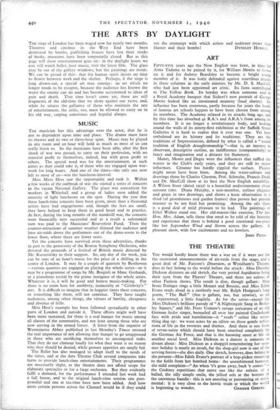THE THEATRE
You would hardly know there was a war on if it were not for the occasional announcements of air-raids from the stage, and a great deal of Mr. Farjeon's Diversion, at Wyndham's Theatre,
does in fact belong to the world before the attack : Miss Dorothy Dickson disinters an old sketch, the very period Aspidistras bring their turn from the Players' Theatre, and there are echoes of
other Farjeon shows. The result is dim, though gallant: Miss Irene Eisinger sings a little Mozart and Rossini, and Miss Edith
Evans reads aloud in a motherly way Mr. Ralph Hodgson's long
poem, " The Bull " (that is gallant, too, but unwise), so art is represented, a little fragilely. As for the satire—except for Miss Dickson's brilliant parody of "A Nightingale Sang in Berke- ley Square," and Mr. Peter Ustinov's savage caricature of an old German lieder singer, barnacled all over her painted Cruikshank face with pride and humiliation—it " reads " rather like some- thing dug up : we want notes by an editor on these gentle reflec- tions of life in the twenties and thirties. And there is one form of revue-satire which should have been smashed completely by the German Air Force, and that is the knowing sneer at life on 'another social level. Miss Dickson as a dancer is someone to dream about : Miss Dickson as a shopgirl remembering her sum- mer holiday is nearly an insult, for the shop-girl now is one of the serving forces—she dies daily. One sketch, however, does belong to the present—Miss Edith Evans's portrait of a hop-picker returning to the fields from her bombed home : the =embittered humour, the mild complaint—" An when 'e's gone away, back 'e comes "- the Cockney repetitions that move one like the refrain of a ballad, the silly simple smile, the jellied eels at the bottom of the enormous bundle: this is not sneering or patronising or senti- mental: it is very close to the heroic truth at which the world






































 Previous page
Previous page